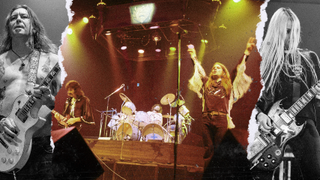The term “rip off” may be the last phrase anyone wants to hear used to describe their band, but when it comes to imitating Black Sabbath, it’s not always a bad thing. After all, their mammoth effect on the world of heavy metal – from their 1970 self-titled release all the way to 2013’s 13 – helped forge a whole new genre, and being brushed with Sabbath comparisons became pretty hard to avoid if wielding fiendish riffs or writing songs about witches was your forte.
Thanks to the legendary British group’s all-consuming influence, stoner/doom metal bands can also usually be spotted by playing a game of Black Sabbath bingo. There’s usually a series of tropes that are adopted by such groups, be it an aesthetic inspired by cult horror classics, occult practices, or a love of certain paraphernalia. Most importantly, though, the genre is all about hellish, drop-tuned riffs and groove-heavy melodies that could soundtrack a black mass or a rock club.
Expect a potent smell of the devil’s lettuce and plenty of pant-blackening riffs as we look at the bands that have drawn from Sabbath’s dark magic.

Electric Wizard
As if spawned from the loins of Tony Iommi himself in a drug-fuelled, ritualistic romp, Dorset-based Electric Wizard are arguably metal’s most devoted Sabbath acolytes. Their band name alone is an ode to the Brummy rock gods, formed of the two Sabbath tracks Electric Funeral and The Wizard. At the forefront of their worship are hazy riffs deployed from drop-tuned SG’s, and a deliciously evil allure.
Incorporating peculiarly-distorted vocal melodies and plodding hooks, Electric Wizard are an amalgamation of their obsessions, and pay homage to not only Sabbath, but Lovecraftian horror, occultism and of course, marijuana.
Sleep
Being fans of stoner metal and Black Sabbath go hand in hand, as does owning Sleep’s 1992 seminal album Holy Mountain, which served as a cornerstone of the genre’s developing scene in the early 90s. San Jose’s Sleep, like Electric Wizard, are quasi-religious Sabbath devotees, and exercise their worship through expansively slow, chasmic riffs that call to mind Iommi’s same axe-slinging sorcery.
Thickened by a veneer of blackened bong smoke, Sleep’s 2018 record The Sciences – released on every weed smoker’s favourite annual holiday, 4/20, no less – has plenty of hat-tipping moments, including hidden images of Sabbath members in the vinyl’s gatefold cover, (you can spot drummer Bill Ward on a milk carton and Iommi on a piece of toast), the track Giza Butler (a play on the city of Giza and bassist Geezer Butler), and a reference to Iommi on Marijuanaut's Theme.
Lucifer
Berlin’s Lucifer reside closer to the occult rock part of Sabbath’s influence, crossing magical imagery with hard rock, a brush of 60s psychedelia and bottom-heavy riffs. Fronted by vocalist Johanna Sadonis, who sounds like a mix between Heart powerhouse Ann Wilson and Dio, Lucifer’s Deep Purple, Blue Öyster Cult and Sabbath influences are easy to spot.
The latter is most obvious on their 2015 debut Lucifer I, through songs such as the eerie Total Eclipse, Sabbath and Purple Pyramid. Their following album, 2018’s Lucifer II, sees them rising from the underground with more radio-friendly melodies, as on Dreamer, which calls to mind Dio-era Sabbath, and more specifically, the 1980 Heaven And Hell track Children Of The Sea.
Witchfinder General
Whether NWOBHM band Witchfinder General actually “got away” with copying Black Sabbath is questionable, but their legacy as part stoner metal/doom pioneers remains concrete, if somewhat overlooked.
Their 1982 debut album Death Penalty – which was criticised for album artwork that featured a topless witch – is stuffed with racing early Sabbath riffs, hazy vocals that sound curiously close to Ozzy’s, and horror-inspired lyrics, which take inspiration from the 1968 film Witchfinder General. Their 1983 release Friends Of Hell features plenty of doomy riffs, but feels less on the nose than its predecessor.
Green Lung
Deeply inspired by their formative surroundings – similar to Sabbath’s ascent from Birmingham’s industrial smog – Green Lung are a modern echo of those that came before. Driven by eccentric British tales and rural folklore, Green Lung meld Sabbath’s esoteric philosophy with the floridity of Queen.
Carried aloft by fantastical riffs, caterwauling vocals and charming flamboyance, their 2019 debut Woodland Rites sees their stoner, early 70s roots sprouting through the mix. 2021’s Black Harvest amps up their theatrical side with plenty of fun grooves that evoke livelier Sabbath tracks like Children Of The Grave and Fairies Wear Boots. And in 2020, Green Lung even covered Sabbath’s Snowblind on a compilation album in tribute to 1972’s Vol.4.
Kyuss
Kyuss have typically refuted any assumptions that they were inspired by Sabbath, with former guitarist Josh Homme even admitting in a 1992 interview that he had never been much of a fan of them in the first place. These comparisons to the British group came flooding in following the release of their 1992 seminal album Blues For The Red Sun, which pinned them to the map as stoner metal kings.
Songs like Molten Universe and Thumb featured gloomy, rumbling riffs, but with more of an abrasive undertone, and felt as close to Sabbath as anything else around at the time. It was also produced by Chris Goss, who fronted Rick Rubin-produced blues rockers Masters Of Reality (a band named after Sabbath’s third album). Although Kyuss’s high regard for bands like Black Flag made them a comfortable fit for punk rock, the Sabbath quality had always been inescapable, much to Homme’s frustration.
“Josh was being honest when he said he wasn’t ever really a Black Sabbath fan,” agreed ex-drummer Brant Bjork.“He was always very comfortable with his punk rock roots. It was kinda frustrating, because I don’t have anything against heavy metal, but I thought Kyuss was a punk band.”
Saint Vitus
Named after the 1972 Black Sabbath song St. Vitus Dance, Los Angeles rockers Saint Vitus were considered one of the “big four” of the initial doom bands, alongside Candlemass, Pentagram and Trouble. In spite of this label, the group never gained much traction, serving as an overlooked footnote within the doom metal pantheon.
They are however, still about, and last released an album, Saint Vitus, in 2019, which, like their previous material, honed in on low-end, devilish riffs straight from the Tony Iommi handbook. Of course, their 1987 album, Born Too Late, was a pinnacle release from the early doom scene, blending velvety vocals – like a mix of Ozzy and Candlemass – with ungodly leaden-footed riffs.
Orchid
Orchid are yet another outfit to have named themselves after a Black Sabbath song. Formed in 2007, the San Francisco occult/doom metallers may only have a small number of albums and EPs under their belts, hardly making them prominent figures of the scene, but their masterly knack for writing tasty riffs is hard to ignore.
Saviours Of The Blind on 2012’s EP Heretic appears like a creeping Black Sabbath, while their 2011 album Capricorn is full of nods to the Birmingham four, including the NIB bass warps on Down Into The Earth and the guitar riff on the title track that sounds a whole lot like Hole In The Sky.
The Sword
From their 2006 debut Age Of Winters, Texan sci-fi/fantasy enthusiasts The Sword have been making a type of bell-bottom boogie metal that crosses Sabbath’s early groove-heavy hits with monolithic thrash. Although somewhat submerged under thick blankets of distortion-soaked riffing, vocalist John Cronise also shares Ozzy’s same urgent, unpolished timbre.
2012’s Apocryphon, which was set out to be a “classic rock” album from the very beginning, feels their most Sabbath-stamped, highlighted by tracks like The Hidden Masters and Seven Sisters.
Witchcraft
Initially formed in 2000 as a one-time Pentagram tribute band, Sweden’s Witchcraft have remained close to their original intentions. Possessing an unvarnished early 70s sound that basked in the smell of incense and cannabis, their first three albums – 2004’s self-titled album, 2005’s Firewood and 2007’s Alchemist – managed to conjure that same mystical element that led Black Sabbath to be stalked by witches and banned from conservative circles.
2012’s Legend was a modernised version of their earlier imitations, albeit with no vintage production, but brimming with jackhammer riffs and crooning vocals. For Paranoid-style chugging riffs, just listen to the introductory track, Deconstruction.


